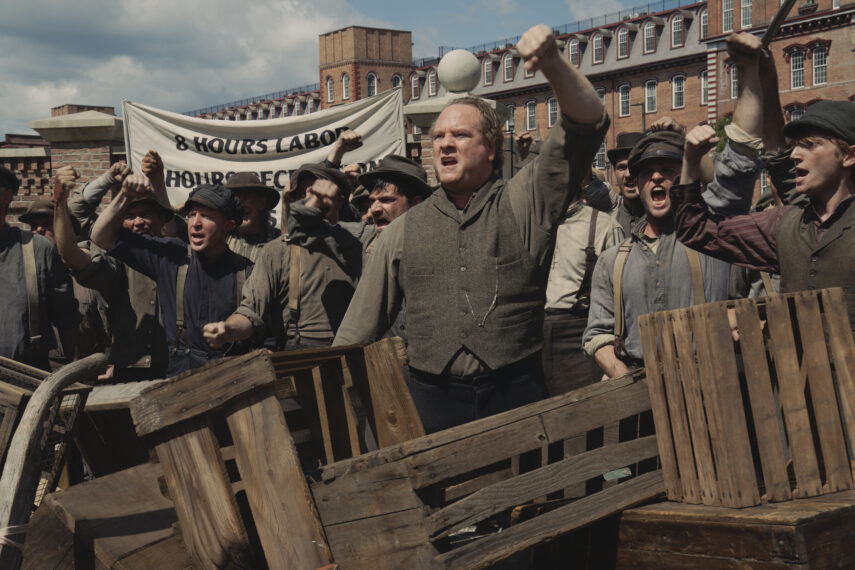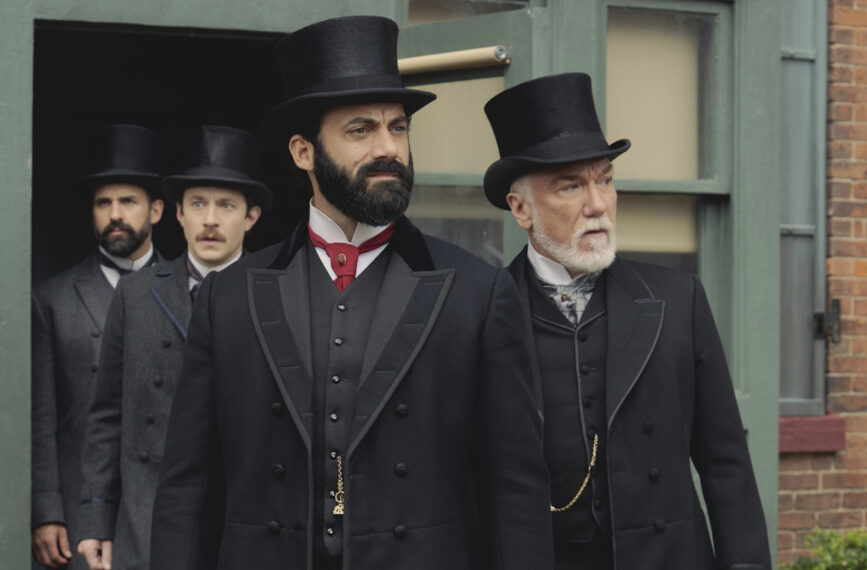Morgan Spector Warns of George & Richard Rivalry to Come

[Warning: The following contains MAJOR spoilers for The Gilded Age Season 2 Episode 6.]
Morgan Spector‘s George Russell saw the climax of the workers’ strike in The Gilded Age Season 2’s sixth episode. Tensions reached a tipping point when Henderson (Darren Goldstein), the union’s leader, and his men faced being shot and killed as they tried to prevent scabs from crossing their picket line. At the very last moment, George stopped the police from carrying out any bloodshed — a move that left his right-hand man, Richard Clay (Patrick Page), seething.
Spector tells TV Insider that while the union has won this battle, there will be more to this war in a potential third season. And George’s humane decision in Episode 6 may cause an irreparable rift between him and Richard, similar to a real-life robber baron and his No. 2 from the same era.
“Obviously these [union] issues aren’t going anywhere, but I would expect we would we would probably take at least a season off” from this strike topic, Spector says. “That’s totally up to Julian [Fellowes, series creator and writer], but I think there’s a there’s a conflict potentially brewing between me and Patrick Page. [Richard Clay] is much more like blood and steel when it comes to how to deal with these questions, and I think George just feels that there’s a more elegant, sort of finesse way to do it.”
George’s call was a more merciful decision than you’d expect from a character based on infamous union buster Jay Gould. But the strike conflict, in particular, is inspired by another steel magnate of the era.

Barbara Nitke/HBO
“There was a similar conflict that could map onto us between Andrew Carnegie and [Henry Clay] Frick,” Spector notes, “who was sort of his right hand man initially, and then Frick broke off. They had a feud, but at one point I think Frick, on Carnegie’s behalf, ordered his men to fire on their workers. Carnegie was sort of like, ‘I’m out of the country, I had no idea this was happening! My hands are clean.’ But probably he did know. The union stuff is not going away [for George and Richard], but this question of how do you approach it, how do you deal with it, and who are your allies in that battle? That could very well be a rich source of drama for next season.”
George’s decision to call off the attack on the striking workers was the result of the respect he developed for Henderson after spending time with his family. Henderson’s children didn’t attend school because their town’s entire economy relied upon the men and boys working at the Russell railroad. Visiting their home made George realize there may not even be a school in the area. When Henderson used himself as a shield for his eldest son as guns were raised against them on the picket line, that was George’s breaking point.
Denée Benton‘s Peggy Scott also faced lethal danger in Episode 5 when an angry mob of white men aimed to kill her and T. Thomas Fortune (Sullivan Jones) in Alabama. Citing this and the strike plot in Episode 6, Spector says it would have made no sense for The Gilded Age to suddenly feature violence that intense.
“To some extent [calling off the attack is] just a practical issue for a show like this,” he explains. “This is not a mafia show. It’s a different kind of program. I don’t know that there’s the room for my character to become someone who just mows down dozens of workers. That said, on a character level, the thing with George is that through Henderson and through his family, he comes to see that there’s not actually that big of a distinction between him and one of these workers. They’re both doing everything they can to provide for their families, and the thing that motivates them really is the well-being of their children and their partner.”
“It may be ridiculous to think that George has never thought about that before, but I think what we see in this season is, for the first time he comes to understand, oh yeah, workers are people,” he adds. With the seeds of a George-Richard rivalry planted, George can now either dig his heels in and continue down the road of being an oppressive robber baron, or he can evolve for the better. Spector doesn’t see the latter happening.

Barbara Nitke/HBO
“I don’t think he can really evolve,” he admits. “I suspect he will continue along the path that he’s on, which is exploiting racism and hatred of immigrants to try to undermine union solidarity. That’s the path that kind of takes us to the present day, like that’s the way you can divide the working class along ethnic and religious lines and you can keep them from becoming a powerful enough coalition to actually take power. I think that becomes George’s strategy, which in some ways is uglier and less honorable than just firing on people.”
Spector says he has seen viewers say that The Gilded Age shouldn’t be covering heavy topics as it’s a happily low-stakes series, but he says “it would be a lie” not to incorporate these real struggles that were going on in 1883 America.
“I’ve seen sort of criticism that feels like, oh, these are two different shows or like, this show can’t encompass all of this stuff. And I understand that, but I also think there’s a really wonderful, kind of subversive wit to the juxtaposition of these things,” he explains. “When you see Peggy hiding in a barn in fear for her life, or you see Henderson being preparing to be shot down by the National Guard, or whoever it is, and then you see these women and men in these drawing rooms worrying about the soup and who’s coming to the next party, there is a point being made there.”
“Yes, we can say these are low stakes for a normal person, but for those people those were the high stakes, because that’s the level of their privilege, that’s the level of their wealth, that’s the extent to which they’re insulated from life-and-death concerns by their money and their power,” Spector goes on. “I think this is a show that handles questions like that very gently, very delicately certainly, but I do think there’s a sense of irony there.”
To ignore this reality of the time period would “be a waste of dramatic potential,” he adds. “It would be strange to turn away from something that was so fundamental to what somebody like [George Russell] would have been dealing with in his business.”
Outside of the Russell sphere, The Gilded Age Season 2 Episode 6 was a major turning point for the Van Rhijn/Forte households. Marian (Louisa Jacobson) reluctantly accepted Dashiell’s (David Furr) proposal when he got down on one knee at a garden party. (TV Insider was on set when that scene was filmed. Learn behind-the-scenes details of that set visit here.) Ada (Cynthia Nixon) and Luke (Robert Sean Leonard) at this point had returned from their honeymoon, but their wedded bliss was ruined when Luke learned that what he believed to be a bad back was actually a sign of a cancer that was spreading.
There’s only two episodes left in The Gilded Age Season 2. Will Marian end up loving Dashiell? Will Ada’s long-awaited love survive? At the very least, Agnes van Rhijn (Christine Baranski) is now being caring with her sister in her time of need.
The Gilded Age, Sundays, 9/8c, HBO




